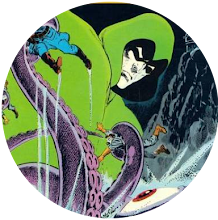Maybe I'm just perverse but, as a kid, I always preferred Jack Kirby's 1970s' work to his output from the decade before.
Perhaps it was that I instinctively felt his all-action, OTT, fling-in-everything-with-the-kitchen-sink approach was ideally suited to concept-driven strips like Kamandi and The Eternals.
But then again, I also liked what I saw of his work on Justice Inc, which, being about one man's fight against crime, was cut from far less grandiose cloth.
This could be because I was always one for an old-style adventurer, or it could be because I felt Kirby's style was also ideally suited to depicting life in the 1930s and 40s.
In Justice Inc #2, a man called the Sky Walker has taken to floating around in the air and destroying things with a big gun that vibrates them to pieces.
Fortunately for those who like their cities intact, the Avenger's on hand to deal with him - but not before gathering a couple of new allies along the way.
The thing that first strikes you is what a complete and total Jonah the Avenger is. He's flying over a train when it promptly crashes. He's driving past a skyscraper when it collapses. Apparently, his wife and daughter were once murdered. You do get the feeling that, if you want to live a long life, standing next to the Avenger isn't probably the best of ideas.
The other thing that strikes you is the Avenger has one of the most unpleasant gimmicks in comicdom, which is that his face is basically made of Plasticine. This means he can rearrange it to make himself look like anyone. On the downside, it also means that, if someone punches him in the face, it leaves a great big dent his fizzog.
He's also what can only be described as a straight glass of water, displaying no signs of a personality whatsoever.
Having a personality is left to his sidekick Smitty who's a bit like Hank McCoy with the thesaurus removed.
The script's credited to Denny O'Neill but the whole thing feels like pure Jack Kirby. The dialogue bears little resemblance to the way anyone real has ever spoken and the plot's a string of events, owing a bucketload to random happenstance.
I certainly enjoyed it as a kid - especially the Avenger's ridiculously thin handgun. But, sadly - unlike Kamandi and The Eternals - being set in a world closer to our own than those were, it can't fall back on spectacle to overcome the problems of its writing, meaning it comes across like a less gripping version of the Shadow. It even ends with the villain plunging to his death, as all Shadow villains seemed required to.
At least the Avenger didn't laugh at the demise of his foe.
But then, with the sort of luck the Avenger had, you get the feeling he didn't get to do much laughing even at the best of times.
Subscribe to:
Post Comments (Atom)









































































7 comments:
"The Sky Walker" was adapted from a story in the Avenger pulp magazine, so it's hard to judge just how much credit (or blame) should go to O'Neil or Kirby. BTW, the blurb on the covers (of the pulp, the comics, and the paperback books) always said it was by "the creator of Doc Savage," but the pulp stories were written by another ghost writer using the same house name.
Steve - you're perverse. (Hey, you said it first.)
I can't help but notice the typestyle in the "Featuring...the Avenger" caption. The "A" resembles the letter from the Avengers masthead, while the rest of the letters are presented in the style of the Fantastic Four title. A very bizarre coincidence, or a nice little sleight of hand. :)
That's the only Justice Inc. issue I haven't read. It's a great title for a comic. When I was dreaming up an imaginary line of b/w magazines for DC in the 70s, I forgot the Avenger.
"...you get the feeling he didn't get to do much laughing even at the best of times."
Especially if you read that two-part story by Andy Helfer and Kyle Baker that DC published in the late 80s.
B Smith
I have all six issues of both DC Justice Inc series. I'd have to say that the first series didn't live up to all the hype it was given at the time. (Oddly enough, it was promoted as part of DC's new 'Sword & Sorcery' line of 1974-'75. Remember that?) As for the second series, it was way over the top and off the rails--serving as an apologist for Castro's Cuba in the process.
I completely agree that Kirby did his best work in the 70s, Steve, so you're no more perverse than me. I trust that will be reassuring.
His last year at DC was a bit weird though. I think it was the only time he worked with writers in between Stan Lee, and then later Steve Gerber on Destroyer Duck in the early 80s. Mostly Denny O'Neil (with Joe Simon and Michael Fleischer on a few issues of Sandman).
As you say, comics like Justice Inc weren't the best use of Kirby's talents, and filling in his contract like that waiting to get rid of him doesn't reflect well on DC editorial. "Here Jack, can you draw an issue of Kung Fu Fighter on your way out the door...."
-sean
Post a Comment